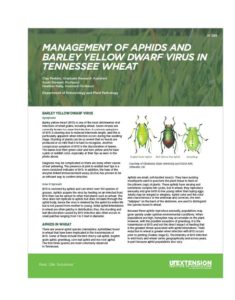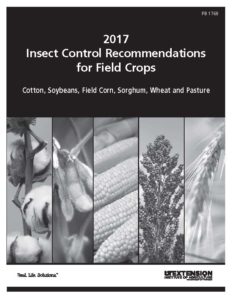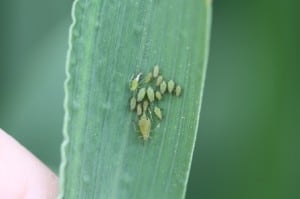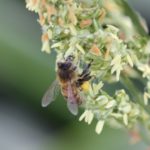 A new publication (W 389), Management of Aphids and Barley Yellow Dwarf Virus in Tennessee Wheat, is now available on line. This publication will provide some timely information for managing aphids during the next 30-45 days, where UT data suggest a late winter insecticide application can reduce the incidence of BYD and increase yields. Typically, pyrethroid insecticides are recommended. Continue reading
A new publication (W 389), Management of Aphids and Barley Yellow Dwarf Virus in Tennessee Wheat, is now available on line. This publication will provide some timely information for managing aphids during the next 30-45 days, where UT data suggest a late winter insecticide application can reduce the incidence of BYD and increase yields. Typically, pyrethroid insecticides are recommended. Continue reading
All posts by Scott Stewart, West TN Research & Education Center
Tennessee Grain & Soybean Producers Conference
The 2017 Tennessee Grain & Soybean Producers Conference is being held at the Dyer County Fairgrounds in Dyersburg, TN on Thursday, February 2nd. On-site registration begins at 7:45. The programs ends after lunch following the Keynote Address by Harrison M. Pittman, Director, National Agricultural Law Center (University of Arkansas System Division of Agriculture) on “Ag Law Update: Recent & Emerging Issues for the Ag Industry”. Preliminary Agenda (updated)
2017 Middle TN Grain Conference
The twelfth annual Middle Tennessee Grain Conference set for Thursday, January 26 at Coffee County’s Fairgrounds in Manchester offers farmers insight to a number of emerging corn, soybean, and wheat production concerns. The conference is scheduled to get underway with registration beginning at 7:30 am. Registration is $20 at the door or $10 if participants pre-registering by Noon, Monday, January 23 through their local UT Extension office. Registration fees include the program and materials, refreshments, lunch, a copy of the conference proceedings, and a grain conference cap. View Program
Focus on Cotton Webcast – Managing Bollworms in Bt Cotton
A new Focus on Cotton webcast titled “Changing Bt Technologies and Bollworm Management in Bt Cotton” helps cotton growers, consultants, and other industry experts monitor the potential impact of bollworm populations and determine when additional treatments may be advantageous. This 53-minute talk by David Kerns, Associate Professor at Louisiana State University Continue reading
2017 Insect Control Recommendations for Field Crops
 The University of Tennessee’s 2017 Insect Control Recommendations for Cotton, Soybean, Corn, Sorghum, Wheat and Pastures (PB 1768) is now available online. Once available, hard copies will be distributed at Cotton Focus, grain conferences, and other crop production meetings.
The University of Tennessee’s 2017 Insect Control Recommendations for Cotton, Soybean, Corn, Sorghum, Wheat and Pastures (PB 1768) is now available online. Once available, hard copies will be distributed at Cotton Focus, grain conferences, and other crop production meetings.
Some features you may have overlooked in the back of the book include:
- Listing of insecticide classes (mode of action) and registration numbers
- A list of common “generic” trade names for various insecticides
- Tables ranking the relative efficacy of insecticides on common pests
- Tips to minimize pesticide effects on pollinators
Do you have aphids in your wheat?
 If you managed to get a good stand of wheat, make sure you scout closely for aphids. There’s a good bet we will have more aphids than usual this fall because of the warm weather. It you are managing for high yielding wheat, then protecting wheat from transmission of barley yellow dwarf virus (BYD) is important. Below are a couple of points to consider. Continue reading
If you managed to get a good stand of wheat, make sure you scout closely for aphids. There’s a good bet we will have more aphids than usual this fall because of the warm weather. It you are managing for high yielding wheat, then protecting wheat from transmission of barley yellow dwarf virus (BYD) is important. Below are a couple of points to consider. Continue reading
Insect Considerations When Planting Wheat
As people start considering planting wheat, there are a few things to keep in mind that will save you some unnecessary insect problems. Below are a few bullet points for your consideration. Continue reading
Mitigating Insect Management Effects on Pollinators (Recorded Presentation)
 The Plant Management Network has released another online presentation in their “Focus on Cotton” series. This new 10 minute video offers suggestions on the steps that growers, pesticide applicators, and beekeepers can take to reduce any negative effects of pesticide applications on honey bees and other pollinators. Link below to watch this presentation narrated by yours truly.
The Plant Management Network has released another online presentation in their “Focus on Cotton” series. This new 10 minute video offers suggestions on the steps that growers, pesticide applicators, and beekeepers can take to reduce any negative effects of pesticide applications on honey bees and other pollinators. Link below to watch this presentation narrated by yours truly.
http://www.plantmanagementnetwork.org/edcenter/seminars/cotton/Pollinators/
